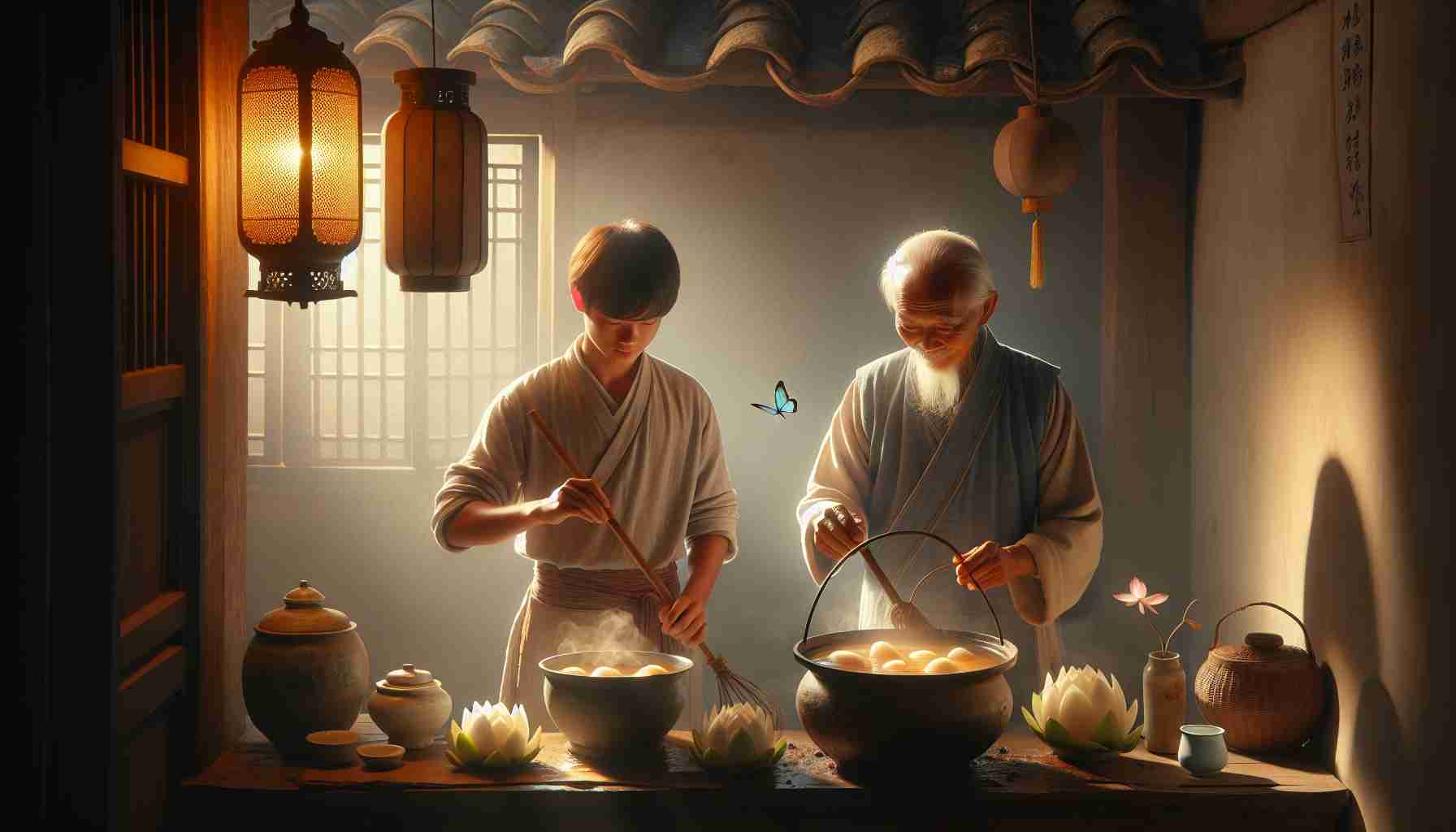

The smell of warm broth drifted through the kitchen, mixing with the sound of raindrops tapping on the old clay roof. I was just a cook then—well, more like an assistant to the cook. My name is Wen, and I helped in the kitchen of Master Yin—a very quiet, very wise elder known for his simple meals and even simpler words.
“Stir from the center, not the edge, Wen,” he told me once, as I tried to make his famous lotusroot soup. “Let the heat rise naturally. The vegetables will know when they’re ready.”
I didn’t understand then. I thought cooking was about fire and fast hands. I wanted to impress him, so I chopped faster, stirred quicker, and poured spices without measuring.
But somehow, nothing I made ever tasted right.
One rainy morning, after another disappointing bowl of bitter porridge, I stomped outside into the courtyard. I sat on a flat stone, grumbling under my breath. “What’s the use of trying if nothing works?”
That’s when an old butterfly landed softly on my knee. Its wings were faded blue, with one side torn just a little. It flapped gently, resting calmly in the drizzle.
I stared at the little creature. It didn’t fight the rain. It didn’t rush to do anything. It simply stayed. Still. Quiet. Waiting.
Later that day, I told Master Yin about the butterfly. He handed me a clean turnip and said, “Cook that. Gently.”
So I did. I didn’t rush. I sliced slowly, feeling the hardness of the turnip in my hands. I placed it in water and let it simmer—no firestorm this time, just calm, even heat. I didn’t shake the pot or poke it every few minutes. I just let it be.
And when I finally served the soup, Master Yin smiled. “Ah,” he said, “the Tao has entered your kitchen.”
I looked down, confused. “Tao?”
“The butterfly taught you,” he said. “It moves by not forcing. It rests when it needs to, and so the world welcomes it. In Tao, we do not force. We follow the Way.”
I never forgot that.
Now, many years later, I teach cooking to young helpers like I once was. And I tell them this: “Don’t chase the flavor. Let it come to you. Let things be what they are.”
In Taoism, there is a teaching that says the greatest action is no-action—wu wei. It doesn’t mean doing nothing. It means letting things happen naturally, without pushing or forcing. Like the butterfly resting in the rain. Like the soup that finds its taste through stillness.
I didn’t change overnight. But each day, as I cook with more stillness, with more listening and less rushing, I feel a peace inside that I never knew before.
And sometimes, just sometimes, a butterfly will land beside my kitchen window—quiet, simple, and free.
And I remember the Way.
The smell of warm broth drifted through the kitchen, mixing with the sound of raindrops tapping on the old clay roof. I was just a cook then—well, more like an assistant to the cook. My name is Wen, and I helped in the kitchen of Master Yin—a very quiet, very wise elder known for his simple meals and even simpler words.
“Stir from the center, not the edge, Wen,” he told me once, as I tried to make his famous lotusroot soup. “Let the heat rise naturally. The vegetables will know when they’re ready.”
I didn’t understand then. I thought cooking was about fire and fast hands. I wanted to impress him, so I chopped faster, stirred quicker, and poured spices without measuring.
But somehow, nothing I made ever tasted right.
One rainy morning, after another disappointing bowl of bitter porridge, I stomped outside into the courtyard. I sat on a flat stone, grumbling under my breath. “What’s the use of trying if nothing works?”
That’s when an old butterfly landed softly on my knee. Its wings were faded blue, with one side torn just a little. It flapped gently, resting calmly in the drizzle.
I stared at the little creature. It didn’t fight the rain. It didn’t rush to do anything. It simply stayed. Still. Quiet. Waiting.
Later that day, I told Master Yin about the butterfly. He handed me a clean turnip and said, “Cook that. Gently.”
So I did. I didn’t rush. I sliced slowly, feeling the hardness of the turnip in my hands. I placed it in water and let it simmer—no firestorm this time, just calm, even heat. I didn’t shake the pot or poke it every few minutes. I just let it be.
And when I finally served the soup, Master Yin smiled. “Ah,” he said, “the Tao has entered your kitchen.”
I looked down, confused. “Tao?”
“The butterfly taught you,” he said. “It moves by not forcing. It rests when it needs to, and so the world welcomes it. In Tao, we do not force. We follow the Way.”
I never forgot that.
Now, many years later, I teach cooking to young helpers like I once was. And I tell them this: “Don’t chase the flavor. Let it come to you. Let things be what they are.”
In Taoism, there is a teaching that says the greatest action is no-action—wu wei. It doesn’t mean doing nothing. It means letting things happen naturally, without pushing or forcing. Like the butterfly resting in the rain. Like the soup that finds its taste through stillness.
I didn’t change overnight. But each day, as I cook with more stillness, with more listening and less rushing, I feel a peace inside that I never knew before.
And sometimes, just sometimes, a butterfly will land beside my kitchen window—quiet, simple, and free.
And I remember the Way.